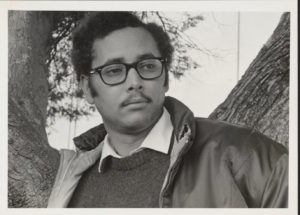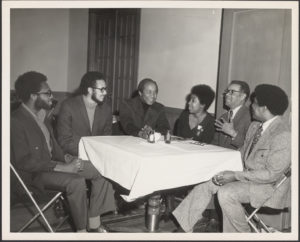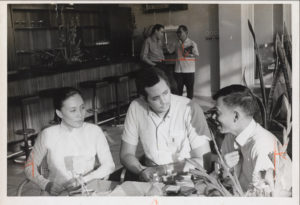This week marks the 76th Anniversary of the Port Chicago Explosion, the worst disaster of America’s World War II home front that took the lives of 320 African American men, and led to the largest work stoppage and mutiny trial in military history. On Friday, July 17 at 1:00pm, The National Park Service will hold a virtual commemoration to honor the deceased, the impact their loss had on addressing racial inequality, and the importance of social justice moving forward. In conjunction with this event, the Oral History Center is pleased to release the oral history of Robert L. Allen, award-winning journalist, author, and professor of African American Studies, whose 1989 book, The Port Chicago Mutiny, uncovered this untold story and helped lay the foundation for what became the Port Chicago Naval Magazine National Memorial. In addition, the Oral History Center has also released the newly-digitized oral histories with Port Chicago survivors that Allen conducted for the seminal book.

In many respects, the life of Robert Allen proves as extraordinary as the many African American men and women whose stories he brought to light through nearly fifty years of writing and scholarship. Born in 1942, Allen grew up in segregated Atlanta where he experienced firsthand the harsh realities of racism, the complicated divisions which ran through the Black community, and the bridges of solidarity that ultimately helped forge the Civil Rights Movement. A graduate of Morehouse College, he moved to New York City in the early 1960s where he abandoned an internship with IBM for a reporting job with the National Guardian. As the publication’s first Black journalist, Allen became a leading voice in documenting the African American experience in the City and the growing intersection between the Civil Rights and Anti-War Movements. In 1967, that intersection became personal as Allen formally refused his draft notice and formed the anti-draft group African Americans for Survival. That same year, his work with the National Guardian allowed him the rare opportunity to explore that same intersection on the international level, attending the International Peace Conference in Czechoslovakia, as well as a multi-week tour of both North and South Vietnam. In 1968, Allen moved to the Bay Area of California to head up the publication’s San Francisco office. It was a region the native Atlantan would come to call home.

The Bay Area not only once again gave Allen a front row seat to national change, it also proved a fertile ground for his growing intellectual interests and curiosity. He had earned a master’s degree in sociology from The New School during his time in New York City, and continued his studies in California with a doctorate from UC San Francisco. In 1975, he began serving as senior editor for The Black Scholar, a position he would hold for the next thirty-seven years. During Allen’s tenure, The Black Scholar became one of the most influential journals of Black Studies in the country, tackling the most pressing issues of the African American community through both its journal and book series. At the same time, his scholarly career began to take footing in the more traditional academic environments, holding positions at San Jose State, Mills College, and UC Berkeley, where he taught in the African American and Ethnic Studies Departments from 1993 to 2012.
The author and editor of many books on the African American experience, Allen is best known for his 1989 book, The Port Chicago Mutiny, which recounted the untold story of the military explosion that cost the lives of 320 African American men and led to the largest mutiny trial in military history. As Allen discusses in his oral history, he stumbled onto the story by accident in other research during the 1970s, not knowing at all what he had discovered or the impact the story would ultimately have. Shortly after publication, his research and work on the Port Chicago Explosion had earned him a Resolution of Commendation from the California State Assembly, as well as a Northern California Emmy Award for the television documentary—rare honors for an academic and writer. And over the years, the impact of the story continued to grow. By 1994, a memorial was formally established at the site, and in 2009, with the signature of President Barack Obama, the Port Chicago Naval Magazine National Memorial was officially created.

In collaboration with our partner and sponsor, the National Park Service, the Oral History Center is pleased to release Robert Allen: From Segregated Atlanta to UC Berkeley, A Life of Activism and African American Scholarship, as well Allen’s digitized oral histories with Port Chicago survivors, Moreover, the OHC is proud to join the National Park Service in commemorating the 76th Anniversary of the Port Chicago Explosion.
Additional Robert L. Allen collections